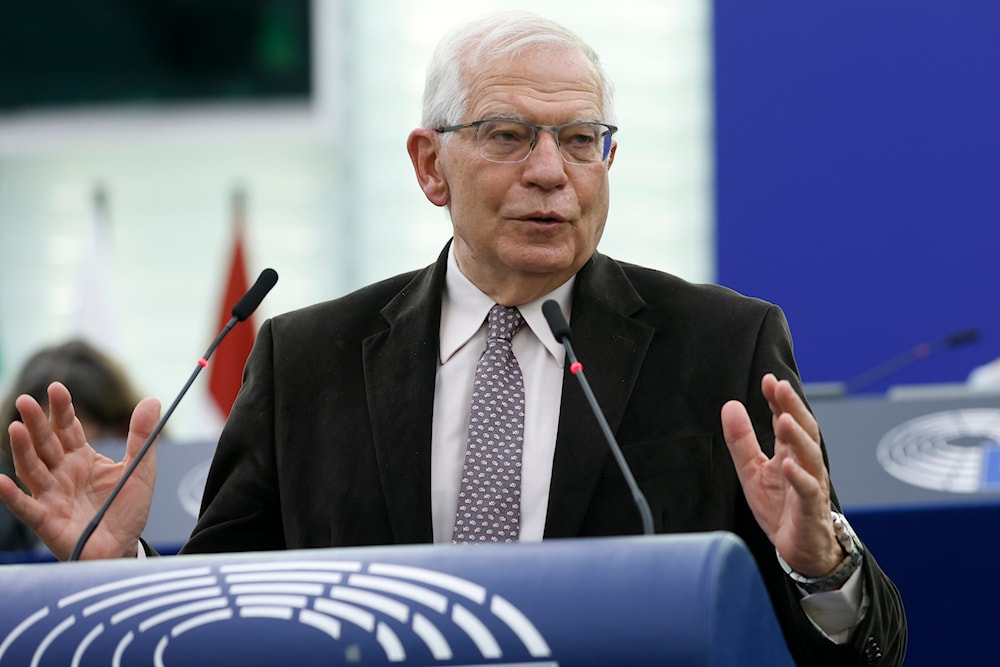Borrell: Next months decisive for Ukraine-Russia conflict
The EU's foreign policy chief warns of the potential repercussions if Russia emerges from its conflict with Ukraine victorious.
-

EU's head of foreign policy Josep Borell delivers a speech during a debate on the conclusions of the European Council meeting of March 24-25, 2022. (AP)
During a visit to Washington, EU foreign policy chief Josep Borrell revealed on March 14 that the upcoming months are decisive for the Ukraine-Russia conflict calling on allies to bolt aid to Kiev.
Borrell's visit to Washington was to meet Secretary of State Antony Blinken among other events following his New York visit to direct the UN Security Council.
"It's this spring, this summer before autumn that the war in Ukraine will be decided," Borrell said.
Borrell stated that in all his meetings, he has shed light on the outcomes of a possible Russian victory in Ukraine.
'Repercussions for America and allies'
If President Vladimir Putin "wins this war and conquers Ukraine and puts a puppet regime in Kiev -- as the one we already have in Belarus – he will not stop there," Borrell emphasized.
"The next months will be decisive," he stressed, adding that "whatever has to be done, it has to be done quickly."
"Many analysts expect a major Russian offensive this summer, and Ukraine cannot wait until the result of the next US elections," Borrell added.
"If Putin succeeds, it will have enormous repercussions for America and the system of alliances built around the US and Europe," he warned
In that scenario, "no country could be sure anymore" that the United States would "come to help any ally" under attack, he further stressed.
Borrell meets Bacon
According to a senior EU official, during Borrell's visit to Washington, he also met with a Republican member of the US House of Representatives Don Bacon.
The official said that Borrell asked Bacon to imagine "Russian tanks in Kiev, a puppet government... Russian troops on the Polish border, on the Balkan borders," further requesting Bacon to send this message to a group of House Republicans currently meeting in West Virginia.
"It's not a game without consequences. In a matter of months, Ukraine can be in an untenable situation," the official stated.
"Imagine the scenario of Russia winning the battle, because we don't provide to Ukraine with the capacity to resist... Republicans should think about it," they added.
Ukraine's war drafting saga continues
Two years after the war in Ukraine began, and as the Ukrainian army faced numerous hurdles, the Financial Times on March 13 reported on what Ukrainian troops call fading motivation and low morale.
A Ukrainian soldier expressed that their motivation was being "killed" on the battleground due to the two years of constant war with no rotation or breaks.
That is one of many reasons, the soldier noted, why men are avoiding being drafted to the frontlines.
A new mobilization legislation, set to be voted on by parliament on March 31, aims to revamp the country's legislative framework in front of a possible recruiting surge this year that might include up to 500,000 individuals. An estimated 330,000 troops are presently engaged on the battlefield.
In September, Ukrainian media reported that almost nine out of every ten Ukrainian draftees who enlisted in the army have either been killed or injured in combat.
The draft would strive to modernize recruiting and training. However, the bill is proving contentious, with more than 4,000 revisions proposed by Ukrainian MPs on the first draft.

 3 Min Read
3 Min Read









